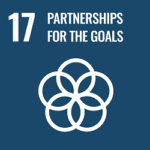United Nations Sustainable Development Goals
The United Nations Sustainable Development Goals (SDGs) make up a global framework to achieve a better and more sustainable future for all. There are 17 goals, each addressing global challenges such as poverty, climate change, peace and justice, which are all interconnected.
The SDGs drive our work on sustainability. They are embedded into our teaching through our Discovery Modules and our Sustainable Curriculum as well as our research and operations.
Find out more about some of our research into global challenges, funded by the Global Challenges Research Fund (GCRF) and the Newton Fund. Watch on the video below how Leeds is making a world of difference.
Our commitment to the SDGs
We are committed to contributing towards the SDGs through our teaching, operations and research.
In 2018 we signed the UN SDG Accord, a global commitment for the education sector to:
- Inspire, celebrate and advance the critical role that education has in delivering the SDGs and advocate the value they bring to governments, business and wider society.
- Annually report on progress in a way that shares learning and best practice both nationally and internationally, and present the SDG metrics at the annual UN High Level Political Forum
Our SDG impact
We do a huge amount of work towards each of the SDGs. Here are just a few highlights of what we’re doing. You can also learn more on our progress here.
Goal 1: No poverty
End poverty in all its forms everywhere
- The University provides financial assistance to both staff and students who need it the most. In 2022 the university awarded extra payments worth £650 to almost 4,000 eligible staff and a further £650 cash payment to those on lower pay grades. The student Financial Assistance Fund has been increased annually.
- The University's Positive Impact Partners programme acts as a gateway to connect diverse third sector and civic partners with our staff and students, to network, share knowledge and experiences, and form new partnerships which in turn improves access to basic services for Leeds' communities.
- Our research project ‘A Different Take’ was an insightful exploration into how media and policy narratives around child poverty in the UK. The model developed through the project went on to inform Leeds City Council’s child poverty strategy.
- Our partnership with Into University helps more than 2,500 young people each year through a programme of academic support, motivation and encouragement to increase access to university for students from disadvantaged backgrounds.
- The University’s Plus Programme is a support scheme for students who come from backgrounds that are less represented at Leeds, including care leavers, students from areas of low participation, or those estranged from their parents. It offers means-tested scholarships, opportunity funds for the costs associated with job interviews and conferences, signposting, events, and pastoral support. You can find out more in the latest Plus Programme annual report.
- Sanctuary Scholarships have helped forced migrants to the UK, covering the full cost of tuition fees and £10,000 a year towards study costs.
Read more about Goal 1 on the UN website.
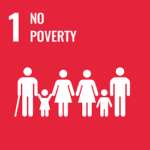
Goal 2: Zero hunger
End hunger, achieve food security and improved nutrition and promote sustainable agriculture.
- The Sustainable Garden provides a space for staff, students and the wider community to grow their own food and reconnect with food sources. The garden includes medicinal plants, herbs, raised vegetable beds and a forest garden – all providing opportunities for staff and student led food planting on campus.
- The University of Leeds is working alongside 16 universities as part of the Agricultural Universities Council (AUC-UK). AUC-UK are working together to discover agricultural teaching and research priorities, and working with farmers and others to contribute to a resilient and sustainable agriculture, land management and food systems..
- The University participated in the N8 AgriFood initiative- a unique research collaboration between 8 research intensive universities in the North of England.
- Our catering service, Great Food at Leeds (GFAL), has held Fairtrade status since 2005, and holds the Sustainable Restaurant Association’s ‘Food Made Good’ sustainability rating across all outlets. They help ensure that healthy and affordable options are available across campus.
- The University follows a Sustainable Food Standard, which includes provisions on sourcing of local and seasonal produce, ethical sourcing, animal welfare and sustainable production.
- The University of Leeds is home to the Global Food and Environment Institute (GFEI). This is an interdisciplinary research community, which brings together members from across academia, industry and public policy. Within the GFEI is the university's research farm (Smart Farm), who work with academic and industry partners to address modern agricultural challenges.
- Our state-of-the-art National Pig Centre works to provide new insights into pig welfare and improve the sustainability and efficiency of pig production. The centre draws on academic expertise across the disciplines of nutrition, animal behaviour, data analytics, engineering, and atmospheric and climate science. Supported by more than £11 million of investment, the facilities make Yorkshire one of the best places in Europe for pig research.
Read more about Goal 2 on the UN website.

Goal 3: Good health and well-being
Ensure healthy lives and promoting the well-being for all at all ages
- The University of Leeds has several ongoing medical and health partnerships, collaborating with local, national and global health institutions. These include the Leeds Teaching Hospitals NHS Trust and the National Institute for Health Research (NIHR) Clinical Research Network Coordinating Centre.
- The Gryphons in the Community and NHS Sports Volunteering programmes support students to deliver sport and physical activity initiatives to a variety of groups within the local community. These projects help bring greater levels of physical activity to those who might struggle to access it and boost community wellbeing, whilst offering students valuable experience.
- Many of our sports and physical activity facilities are open to the local community, supporting local sports clubs and community groups.
- The University of Leeds has made a commitment to being a smoke-free campus. We also support student and staff wellbeing, actively promoting good mental health and offering access to a range of support services and resources.
- Our ongoing Positive Impact Partners programme has connected University staff with local third-sector health organisations. Through PIP, we facilitate the development of one-to-one support partnerships, knowledge exchanges, and collaborative project work, to help overcome specific challenges the organisations face.
Read more about Goal 3 on the UN website.
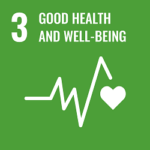
Goal 4: Quality education
Ensure inclusive and equitable quality education and promote lifelong learning opportunities for all
- Our highly sought-after Students into Schools programme connects our students with local schools in the West Yorkshire area. Through this programme, university students share their passion for their subject with local schools and give something back to the community, in the areas that need it most.
- The Leeds Institute for Teaching Excellence (LITE) promotes and supports innovation and excellence in teaching and disseminates outcomes for impact on student learning. It offers teaching enhancement programmes, mentoring and fellowships in all areas of student education.
- Our Lifelong Learning Centre (LLC) works to create opportunities for under-represented groups to access and enjoy the benefits of Higher Education, operating on the belief that people of any age should not be bound for their lifetimes by the decisions and experiences of their past. The LLC offers programmes of study as well as a wide range of support for both current and prospective mature, part-time and Foundation level students; especially those from disadvantaged and under-represented groups.
- We offer a range of continuing professional development (CPD) and short online courses.
Read more about Goal 4 on the UN website.
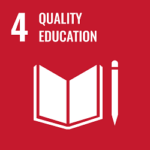
Goal 5: Gender equality
Achieve gender equality and empower all women and girls
- Through our outreach programmes we are working to boost recruitment of students in groups that are underrepresented at university. We have a strong commitment to supporting women in STEM.
- We have a number of dedicated programmes to support women such as Generation Delta Brave Space Mentoring. We also have a dedicated Women at Leeds Network and professional development schemes for staff, such as Springboard for Women grade 2-5 and Aurora.
- We received the prestigious Athena SWAN Silver Award in September 2021 from the Equality Challenge Unit, the national body that promotes equality in the higher education sector, which recognises our strong and continued commitment to gender equality.
- Our Edge sport and wellbeing complex used the ‘This Girl Can’ campaign to introduce of a variety of initiatives to motivate more women to take part in sport and physical activity. This included female-only swim sessions and strength-training courses available to university staff, students and the public.
- The gender pay gap is associated with a need to address an unequal distribution of men and women across the levels of an organisation. We take our responsibility to close this gap seriously, and publish an annual Gender Pay Gap report, detailing these figures and highlighting the work we are undertaking to get there.
Read more about Goal 5 on the UN website.
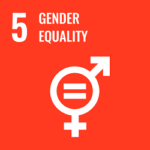
Goal 6: Clean water and sanitation
Ensure availability and sustainable management of water and sanitation for all
- The Water@Leeds network draws together around 150 academics and 170 PhD students from across the University to deliver excellent, internationally leading water science, technology and policy research. Recent projects include HyCristal, which explores climate change adaptation and resilience in East African communities, and is supporting COP26 priorities. You can read the latest Water@Leeds annual report here.
- Our many free and accessible water fill-up points across campus have been instrumental in reducing plastic waste across campus and providing access clean drinking water across all facilities.
- A team at the University of Leeds is a key partner in the £17.7 million Water Security and Sustainable Development Hub. This international partnership of 55 organisations from 12 countries includes collaborators from Colombia, Ethiopia, India, Malaysia, and the Universities of Newcastle and Oxford seeks to identify the barriers holding back the delivery of sustainable water services across the globe.
Read more about Goal 6 on the UN website.
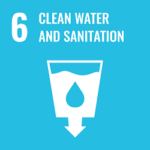
Goal 7: Affordable and clean energy
Ensure access to affordable, reliable, sustainable and modern energy for all
- Our Climate Plan and Seven Climate Principles outlines our commitment to reorientation of our research away from fossil fuels towards clean energy. It includes a commitment to reach net zero by 2030. This will involve using renewable energy, retrofitting university buildings, and using low-energy light bulbs. Our climate plan is regularly reviewed, and progress on net zero is provided quarterly – the latest reports can be found here.
- We are part of the DecarboN8 network of research-intensive universities across the UK, which brings together researchers, government, industry and communities to design solutions that can be deployed rapidly and at scale in the process of decarbonisation.
- We are working with Leeds City Council, in particular through the Leeds Climate Commission and our Living Lab Programme, and with other partners, towards the goal of making Leeds a net-zero carbon city by 2030.
- Research by the Clean Energy Research Alliance (CERA) at the University has been used to inform policy, create online courses and empower communities, including through the creation of three online courses.
Read more about Goal 7 on the UN website.
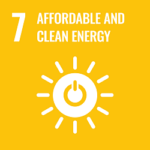
Goal 8: Decent work and economic growth
Promote sustained, inclusive and sustainable economic growth, full and productive employment and decent work for all
- Nexus, the University’s £40 million innovation hub, demonstrates our commitment to building collaborations with businesses to help them innovate and grow. Nexus offers continued support for businesses in the Leeds city region, through access to training, resources and facilities, as well as regular events and networking.
- The University of Leeds’ entrepreneurship support scheme, SPARK, provides students with a range of support and resources when thinking about starting their own business including financial support, mentoring, professional career advice and access to physical and online resources. SPARK, along with our Centre for Enterprise & Entrepreneurship Studies, have both won all four major national awards for University and Student Entrepreneurship within the UK for our work in this area, the only University to ever achieve this.
- We are proud to pay the National Living Wage to all staff employed by the university
Read more about Goal 8 on the UN website.
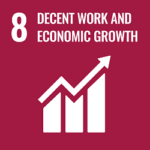
Goal 9: Industry, innovation, and infrastructure
Build resilient infrastructure, promote inclusive and sustainable industrialization and foster innovation
- Our Centre for Technology Innovation and Engagement (C-TIE) brings together management researchers sharing an interest in the factors that shape the innovation processes. Through collaboration between academic researchers and practising innovation executives from profit and non-profit organisations, we develop strategies for addressing academic and practical challenges.
- Our popular annual ‘Be Curious’ event attracts a wide audience from the local community. The event showcases variety of research taking place at the University, particularly engineering, transport and the sciences. With live family events, fun activities, challenges and inspiring evening talks, there was something for everyone to enjoy.
- Since 1995 we've created over 110 spin-out companies, all based on research expertise within the University. Six of our companies are listed on the Alternative Investment Market (AIM) and in total our companies employ over 1000 people.
- C-Capture, a spin-out from the School of Chemistry, is being used in the first bioenergy with carbon capture and storage (BECCS) pilot project of its kind in the world.
Read more about Goal 9 on the UN website.
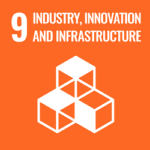
Goal 10: Reduced inequalities
Reduce inequality within and among countries
- The University’s world-leading Centre for Disability Studies (CDS) was the first of its kind in the country. The CDS is an interdisciplinary network of researchers from across the social sciences, humanities and STEM subjects, united by their commitment to carrying out research and teaching that helps achieve equality and social justice for disabled people, globally.
- Our Access and Participation Plan outlines how we will ensure that students from all backgrounds are able to progress to, and benefit from, an enriching and successful experience at Leeds. This strategy works across five pillars and takes us forward to 2025.
- We have a range of policies, activities and resources supporting reducing inequalities at the University, available through our Equality and Inclusion Unit.
Read more about Goal 10 on the UN website.
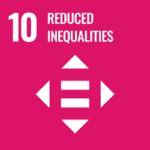
Goal 11: Sustainable cities and communities
Make cities and human settlements inclusive, safe, resilient and sustainable
- Both University galleries, the Stanley & Audrey Burton Gallery and Treasures of the Brotherton Gallery are open to the public, with frequent events, seminars, drawing sessions and workshops.
- Our Bike Hub was previously awarded CityConnect’s Bike Friendly Business Gold Standard for its ongoing work to promote cycling to staff and students and the storage, maintenance, training and equipment it offers. The Bike Hub orders in bulk to reduce emissions associated with deliveries and prioritises plastic-free suppliers, and it’s also chemical free, having switched to plant-based Green Oil products in 2017.
- The University grounds play host to an array of public green spaces for everyone to enjoy, providing much-needed access to nature in the city-centre. Our green spaces host a sustainable garden, a wheelchair accessible sensory garden, and hold the stories of Leeds’ residents throughout history.
- During their time in Leeds, we encourage students to think beyond their studies and to become responsible citizens who positively contribute to the communities where they live and work. We offer regular citizenship training workshops to our students, facilitate student volunteering and community work, and operate a robust neighbourhood complaints process.
Read more about Goal 11 on the UN website.
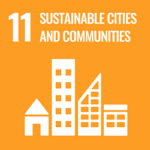
Goal 12: Responsible consumption and production
Ensure sustainable consumption and production patterns
- The University has been working towards becoming plastic free. In 2022 the Sustainability Service held the Big Plastic Count on Campus where students and staff were asked to report the single-use plastic that they found on campus. A new plastics programme has been developed to integrate plastic reduction efforts with our Climate Plan.
- Students can integrate sustainability into their degree through discovery modules, embedding in research and coursework, or by undertaking specific degree programmes. One discovery module, ‘Sustainable Consumption’, can be taken by students from any School across the University.
- The university has recycling bins around campus so that staff and students can responsibly dispose of their waste
- The university also has a reuse@leeds site which allows staff and students to share their surplus items within the University, create wishlists, set up notifications and even ask to loan items in a way that is more cost efficient and environmentally friendly than throwing out and buying new. The initiative has helped avoid over 19,000kg of waste – saving over 100,000kg CO2, the equivalent of taking 48 cars off the road.
- Our Reuse, Recycling and Waste Standard explains the principles that must be for resource use and the final disposal of resources by the University. It also sets out the requirements for managing waste & recycling at the University, including hazardous waste.
Read more about Goal 12 on the UN website.
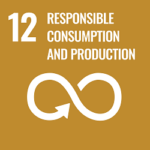
Goal 13: Climate action
Take urgent action to combat climate change and its impacts
- The University's Climate Plan is made up of seven climate principles, and includes a target of net zero emissions by 2030. In 2023, we shared our Net Zero Delivery Plan which sets out some of the key projects which will help us deliver this ambitious target. Our climate plan is regularly reviewed, and reported on – the latest reports can be found here.
- Our Climate Plan recognises the need to work closely with Leeds City Council, including through the Supporting a Net Zero City principle. Collaboration, communication and shared learning with the Council and wider networks are a key element of the Climate Plan, bringing together researchers, operational staff and the wider community in Leeds.
- The University of Leeds has eight lead authors for the UN Intergovernmental Panel on Climate Change (IPCC) 6th assessment report in 2022, and two lead authors on each of the IPCC Special Reports on Global Warming of 1.5°C (2018) and Climate Change and Land Use (2019).
- We are part of the Leeds Climate Commission and Yorkshire and Humber Climate Commission. Chaired by Andy Gouldson from the University of Leeds, The Leeds Climate Commission is a pioneering collaborative yet independent voice in the city, providing authoritative advice on steps towards a low carbon, climate resilient future so as to inform policies and shape the actions of local stakeholders and decision makers.
- We are lead partners in the Integrated Catchment Solutions Programme (iCASP), a research programme of flood management for climate change disaster and risk monitoring, that combines regional local authorities and academics.
- The University of Leeds is working with Climate Action Leeds to provide a pioneering climate action hub called Imagine Leeds. Imagine Leeds is a new civic action and planning space that brings together diverse stakeholders to explore how the city can better respond to climate mitigation and adaptation, especially drawing on skills and experiences at the community level.
Read more about Goal 13 on the UN website.
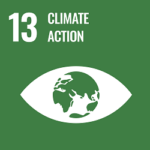
Goal 14: Life below water
Conserve and sustainably use the oceans, seas and marine resources for sustainable development
- Our Water@Leeds network is involved in an extensive range of local, national and global partnerships, seeking to develop solutions to the world’s most pressing water issues. The network nurtures partnerships with a wide range of people and business that will help both to further research for all parties involved, as well as providing the necessary tools to train the next generation of researchers. Work includes a £9 million NERC funded programme to investigate freshwater quality pollution in rivers across the UK. You can also read the latest Water@Leeds annual report here.
- The University's Brownlee Triathlon Centre has been the site of the Bodington Fields Living Lab flood alleviation scheme, where a range of natural flood prevention measures have been installed along with tree planting. This helps to reduce flooding in the local area and wider River Aire catchment as well as acting as a demonstration site for these measures. In 2023 the balancing pond at the site was used to house a population of white clawed crayfish rescued from a nearby stream.
- As part of the University’s Living Lab programme the iconic Roger Stevens pond was redeveloped by the University’s Sustainability Services Team, Estates Services, School of Biological Sciences, School of Geography and the School of Civil Engineering to transform the cooling pond into a promoter for biodiversity and scientific research. A project is underway to develop a digital twin of the pond to support further research in this area.
- Our Sustainable Food Standard ensures that we exclude fish species identified as most at risk by the Marine Conservation Society, where possible. We also work with our suppliers to ensure that the fish we serve comes from sustainably managed sources and serve a diverse species of fish to reduce pressure on sensitive stocks.
Read more about Goal 14 on the UN website.
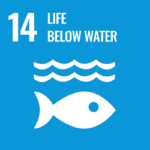
Goal 15: Life on land
Protect, restore and promote sustainable use of terrestrial ecosystems, sustainably manage forests, combat desertification, and halt and reverse land degradation and halt biodiversity loss.
- In 2023, the University planted the new Gair Wood in north Leeds, in collaboration with United Bank of Carbon and the White Rose Forest. The woodland has been planted with more than 60,000 trees, a portion of which were planted with volunteers as an experimental research woodland. The site provides benefits for biodiversity and public access, acts as a Living Lab site for research and teaching, and contributes towards efforts to tackle the climate crisis.
- The Living Lab project I-tree, funded by funded by United Bank of Carbon, the University of Leeds Sustainability Service, the University of Leeds Living Lab programme, and the Woodland Trust, generated an in-depth report on the value of trees across the University’s campus.
- As a corporate member of the Yorkshire Wildlife Trust, the University holds numerous volunteer days throughout the year to preserve and enhance biodiversity on conservation sites.
- The Leeds Ecosystem, Atmosphere and Forest (LEAF) centre researchers have collaborated with Leeds City Council and the United Bank of Carbon to establish a Forest Observatory. The Leeds Forest Observatory (LFO) will allow students and staff from the University to contribute to the collection of long-term environmental measurements and study the role of forests in the provision of ecosystem services.
- Wild Ingleborough is a partnership between Natural England’s Ingleborough National Nature Reserve team, Yorkshire Wildlife Trust, The University of Leeds, UBoC, The Woodland Trust, and WWF to further the restoration of wildlife habitats around Ingleborough in the Yorkshire Dales National Park. The project involves working closely with local landowners, farmers and the community to share knowledge of nature conservation and low-intensity farming practices, and helping wildlife to be more resilient in the face of the climate emergency and other pressures.
Read more about Goal 15 on the UN website.
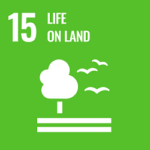
Goal 16: Peace, justice and strong institutions
Promote peaceful and inclusive societies for sustainable development, provide access to justice for all and build effective, accountable and inclusive institutions at all levels
- Our expert Centre for Law and Social Justice explores the role that law has in addressing inequalities and achieving a more just society. It aims to generate research that addresses the global challenge of inequalities, exploring the themes of accessing and enacting justice, law and social sustainability, and (legal) embodiment.
- To ensure we remain committed to our core value of integrity, University policies include codes of Practice on Corporate Governance and Whistleblowing, as well as Research Ethics and Anti-bribery.
- Community engagement is a key activity within the School of Law. This includes the legal 'pop-up' clinics which have brought volunteering students, pro bono lawyers and community partners together to provide free legal advice services to members of the local public, within the community setting.
- Policy Leeds works to connect researchers and policy professionals in order to inform policy development at local, national and international levels. This includes producing policy briefs and blog series, developing innovative collaborations with policy professionals, and sharing best practice and supporting the development of new approaches for research-policy engagement
Read more about Goal 16 on the UN website.
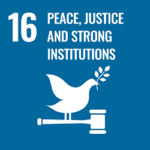
Goal 17: Partnerships
Strengthen the means of implementation and revitalize the global partnership for sustainable development.
- The University of Leeds works collaboratively with Leeds City Council in developing policies to help tackle the SDGs. We have developed 13 research projects including the Inclusive Growth Strategy (Inclusive Growth Leeds | Inclusive Growth Leeds) and Best City Ambition (Best City Ambition (leeds.gov.uk)), which address issues such as poverty, climate change and health and wellbeing. Through our Sustainable Travel principle we have collaborated on city-wide developments, including bike-docking system, and Connecting Leeds Transport proposals.
- The University is part of the Yorkshire and Humber Policy Engagement Network (Y-PERN). Y-PERN is a network of Yorkshire Universities and Yorkshire and Humber Councils working together to support inclusive, research-informed regional development policy and strategy.
- Providing a Sustainable Curriculum is one of the seven core principles of the University’s Climate Plan. The university has over 300 modules focused on sustainability, and over 10,000 modules that include sustainability themes.
- Researchers from the University attended COP26 (2021), COP27 (2022), COP28 (2023) and COP29 (2024). The University of Leeds has contributed to important discussions and negotiations that take place at these events. Key themes include gender and climate action , agriculture , decarbonisation and indigenous communities .
- The University is focusing our research on the SDGs and tackling the world’s biggest challenges to extend our global impact through supporting more than 70 Global Challenges Research Fund (GCRF) or Newton award research projects across over 40 different countries.
- The Sustainability Research Institute (SRI) specialise in participatory, action-oriented research that brings together government, business, NGOs and local communities to enhance the relevance, quality and practical influence of our research.
- The University is a signatory of the SDG accord, showing our commitment to constantly reflecting on our contribution to all 17 SDGs.
Read more about Goal 17 on the UN website.
